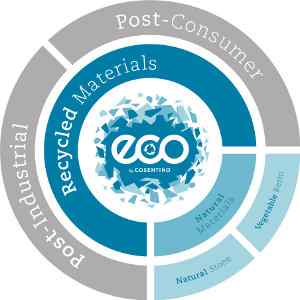Many years of comprehensive research and development have gone into a surface that has been engineered to be a state-of-the-art product that embraces sustainability. Eco countertops are a highly sustainable, ecological alternative to similar countertops. They reuse waste products to make sensible use of natural resources that would normally go to waste. Eco countertops are manufactured from 75% recycled materials (25% is a blend of quartz, natural stone, pigments and vegetable resin) and still maintain the design and quality that people expect from Silestone. Throughout the manufacturing process, even 94% of the water is re-used in conjunction with recycled materials:

- Porcelain from tiles, sinks, toilets, and other similar products
- Glass, windows, containers and glassware
- Mirrors from dwellings, buildings and factories
- Earthenware from reclaimed tiles
- Vitrified ash and waste from blast furnaces and power generation
Eco Countertops boast that they are at the forefront of a new era where ecological awareness, environmental respect, and sustainability all play a crucial role… where life demands responsible consumption, an awareness of one’s environmental impact, and a goal of improving our quality of life. The first step is in the manufacturing processes where recycling is an essential step towards achieving a more efficient use of our resources.
Eco Countertops Production Process

- The raw materials are supplied by commercial organizations that specialize in waste management. These materials undergo a thorough cleaning, filtering, and grading process.
- The materials are then poured into a mixer and combined with exclusive environment resin.
- When the mixture has melted, it is spread onto a large conveyor belt and compressed.
- The compressed product is treated in an industrial oven for 1 hours and allowed to cool for a day.
- The slab is calibrated and polished with diamond buffing pads to create the finished product.
Advantages of Eco Countertops
♦ Reduces landfill waste
♦ Saves energy by not using new raw materials
♦ Re-uses of obsolete and discarded items
♦ Reduces consumption of natural resources
♦ Reduces water usage – recycles 94% of water used
♦ Reduces emissions throughout manufacturing
♦ Filters 99% of Volatile Organic Compounds (VOCs)
♦ Uses no solvents in machinery cleaning and maintenance
♦ Uses advanced filtering systems
♦ Re-uses every product